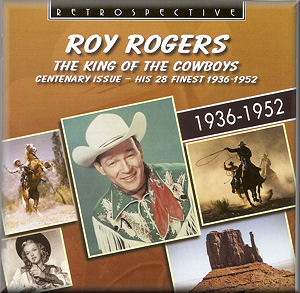 CD Reviews
CD Reviews MusicWeb
Webmaster: Len Mullenger
Len@musicweb.uk.net
[Jazz index][Purchase CDs][ Film MusicWeb][Classical MusicWeb][Gerard Hoffnung][MusicWeb Site Map]

Roy Rogers — The King of the Cowboys, Centenary Issue
- His 28 Finest 1936-52
![]() RETROSPECTIVE RTR4191 [78:10]
RETROSPECTIVE RTR4191 [78:10]
Buy
through MusicWeb
£7.00
post free
1 Tumbling Tumbleweeds
2 ’Way Out There
3 Ride, Ranger, Ride
4 Cowboy Night Herd Song
5 The Devil’s Great-Grandson
6 When The Golden Train Comes Down
7 Hold That Critter Down
AS ROY ROGERS
8 Dust
9 Listen To The Rhythm Of The Range
10 Hi-Yo, Silver!
11 When I Camped Under The Stars
12 Headin’ For Texas And Home
13 Along The Navajo Trail
14 Rock Me To Sleep In My Saddle
15 A Little White Cross On The Hill
16 My Chickashay Gal
17 On The Old Spanish Trail
18 San Fernando Valley
19 Roll On, Texas Moon
20 Don’t Fence Me In
21 A Gay Ranchero
22 Hawaiian Cowboy
23 Blue Shadows On The Trail
24 Pecos Bill
25 Home On The Range
26 Stampede
27 A Four-Legged Friend
28 Happy Trails (With Dale Evans)
Here we trace Roy Rogers—born Leonard Slye—on disc between 1936 and 1952. There’s nothing from Trigger, though there’s a nice picture of the equine star on the booklet cover. The fare is solid cowboy material, much of it drawn from the films in which Rogers starred during those years.
The first records are under the name of the band, Sons of the Pioneers. Bob Nolan was a galvanising presence in the outfit, composing a number of the songs, and he was absorbed into the band which then recorded as ‘Roy Rogers and Sons of the Pioneers’ which demonstrates that by mid-1937 Rogers was beginning to headline. These early tracks have charm, yodelling, a folk fiddle and a certain amount of strangulated yowl—try the Cowboy Night Herd Song, for which a certain tolerance is necessary, or a glass of whisky. Fortunately the fiddler Hugh Farr was a sensitive musician and adds a cleverly expressive obbligato on one or two tracks, including this one.
After the War, the Sons of the Pioneers resumed recording, but by this time there was a slightly engorged and stylistically inflexible backing band in place, Farr had gone but three fiddlers had replaced him, including Harry Bluestone, a quite well known player. These tracks are looser, more cosmopolitan, and commercially compromised artefacts, and significantly less interesting than the 1936-38 discs. Rogers’s singing of standards was hit and miss, and the arrangements didn’t always assist. There’s a particularly outlandish steel guitar solo in Don’t Fence Me In, for example. What’s missing, however, can be gauged from the tired, lame Hawaiian Cowboy, which is too cosy, and utterly lacks the vitality that so animated the earlier records. Still, Home on the Range is here and that was recorded in 1947, becoming the Kansas State Song in the same year.
But horses for courses; if you’re a Rogers fan this good selection will certainly do.
Jonathan Woolf